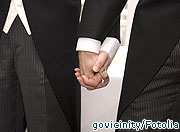Traditional marriage campaigners in the Republic of Ireland have said they fought a good campaign in the face of much opposition, following the country’s vote in support of same-sex marriage.
Friday’s poll saw 62 per cent of voters back a change to Ireland’s constitution, with 38 per cent opposing the redefinition of marriage. Turnout was 60 per cent.
Ahead of voting day, concerns had been raised about intimidation of ‘No’ voters, with pictures appearing on social media of pro-traditional marriage posters being taken down in Dublin.
Children
Irish sports star Ger Brennan said he opposed the change because children are best raised by a mother and father.
He also commented that he was “sick of the accusations being flung around that if you vote ‘No’ you are homophobic”.
Commentator Ruth Dudley Edwards said she backs same-sex marriage but: “What made me wobble slightly in my support for the Yes side was its hysterical tone, the emoting and the contemptuous and sometimes vicious treatment of the opposition and the refusal to take its concerns seriously.”
Responding to the vote, Mothers and Fathers Matter said it was disappointed at the result, but added: “We did far better than the opinion polls suggested”.
Freedom of conscience
The campaign group said it “ran a good campaign with limited resources and in the face of such overwhelmingly powerful opposition”.
“We are proud to have represented the very many people who did vote No and who had no political party willing to support their point of view. We gave them a voice they would not have had otherwise”, it added.
The Iona Institute also noted that ‘No’ voters were not represented by political parties and that the campaign was “always going to be an uphill battle”.
David Quinn, the Iona Institute’s Director, commented: “We hope the Government will address the concerns voters on the No side have about the implications for freedom of religion and freedom of conscience.”
Good relationships
The Church of Ireland said the referendum result does not alter its definition of marriage, adding: “The church has often existed, in history, with different views from those adopted by the state, and has sought to live with both conviction and good relationships with the civil authorities and communities in which it is set.”
In an editorial, the UK’s Daily Telegraph noted that the ‘No’ vote represented a “significant minority”.
“This despite the fact that there was an almost total reluctance of people and institutions publicly to support a No vote”, it added.
Northern Ireland
Ballot papers asked voters if they agreed with the statement: “Marriage may be contracted in accordance with law by two persons without distinction as to their sex”.
Ireland is the only country in the world to support same-sex marriage in a nationwide vote, and the first ceremonies could take place in the autumn.
The Northern Ireland Assembly has voted against same-sex marriage four times in the past three years.

